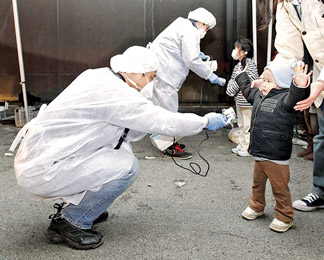Atomic energy feasible?
Text and pictures by Ishara Jayawardane
The recent disaster - the 8.9 magnitude earthquake - that hit the
industrious nation of Japan is on everyone's minds. The bombing of
Hiroshima Nagasaki was a manmade disaster. But this was no act of
vengeance by flesh and blood. Some would say it was the force of mother
nature; retaliating at man's pollution of the environment. Daily News
recently spoke to Atomic Energy Authority Chairman Prof W Abeyewickreme
on how Sri Lanka would fare in the face of such a scenario.
Q: Are we in danger of being affected by radiation emitted by
the Fukushima power plant?
|

Atomic Energy Authority Chairman Prof W Abeyewickreme |
A: So far we cannot definitely say we are not in danger
according to the information we have received from the International
Atomic Energy Agency. Because we have to always follow the information
or news sent by the Agency. We have been getting messages from them
regularly via text. So we are monitoring the situation thoroughly and if
there is any danger we will be informed. We have also established a link
with other Asian countries through a network and are monitoring the
situation. If there is some danger the other countries will feel it
before us.
Q: You are exploring possibilities of nuclear power after
2025. Is this true?
A: For the moment prefeasibility studies have been
recommended. It is not even a feasibility study. Because no firm
decision has been taken, during the prefeasibility study all these
incidents that have taken place in the recent past can be taken into
consideration. Science and Technology should advance, through those
advancements only can countries develop.
One good example is Korea and Singapore because they use appropriate
new technologies at the appropriate time, they are in a position where
they are better off than other Asian countries. So we have to always
keep this concept in mind.
Just because some unfortunate incident has taken place we cannot
abandon entire programs. But at the same time we have to be vigilant,
take intelligent decisions considering all factors.
I must emphasise that so far we have not taken a decision to go for
nuclear power. On the other hand there are lots of software programs
which will help a country to decide on energy planning.
|

Fukushima residents being scanned for radioactivity |
However this will not happen in the immidiate future, it will be
after year 2025. We have no reason to panic. We have to remember that
these plants which have exploded are almost 38 years old. Any nuclear
plant, after 40 years is considered "time over". Then these plants have
to be decommissioned. They had planned to do just this to the Fukushima
in another two years.
Q: Will we have nuclear power?
A: It has to be an intelligent decision. Even the
prefeasibility study will take at least two years to complete, it might
even go on to four. If the plant designing takes place in 2020, the
scientist and decision makers will have to assess the situation, at that
time. More advanced technologies are coming out.
Q: What measures can be taken to prevent this from happening
in Sri Lanka if we do introduce nuclear power, in the light of what
happened in the 2004 tsunami?
A: We have to remember that there are changes in the
environment occurring in ever increasing frequency, mostly due to global
warming. We have to think of these issues seriously and think of ways to
minimise these affects on the environment.
The biggest problem with energy is environmental pollution due to use
of hydro carbon fossil fuel. If we continue using fuel at this rate it
will further increase global warming. At the same time nuclear energy is
said to be the cleanest and most environmentally friendly when compared
to conventional power sources.
Q: Once Sri Lanka acquires atomic power, can a tsunami early
warning system solve the problem?
A: Technology has advanced. All these nuclear power plants
have auto shut down systems. Computer systems will identify the
slightest tremor and the plant will shut down automatically.
Due to the high temperatures inside, cooling systems should be
available. What happened in Japan is all these incidents occurred
simultaneously.
When the tsunami hit, power supplies failed and all the alternative
power supplies also failed. The batteries functioned only for eight
hours and they were unable to recharge the batteries.
With the advancements of technology human errors and technological
failures can be addressed and more advanced technologies have to be
incorporated.
However a feasibility study will grant us the opportunity of human
resource development. We will develop graduates with knowledge of
nuclear power and its applications and if we don't have a plant in the
near future as planned, we will have a human resource development pool
which can even help other countries while getting training in other
countries to provide expertise.
These types of programs have to be conducted in universities and
technical colleges and faculties of engineering and science. Young
students will graduate with theoretical and practical knowledge in these
subjects so that they can serve if not Sri Lanka, other countries. |



